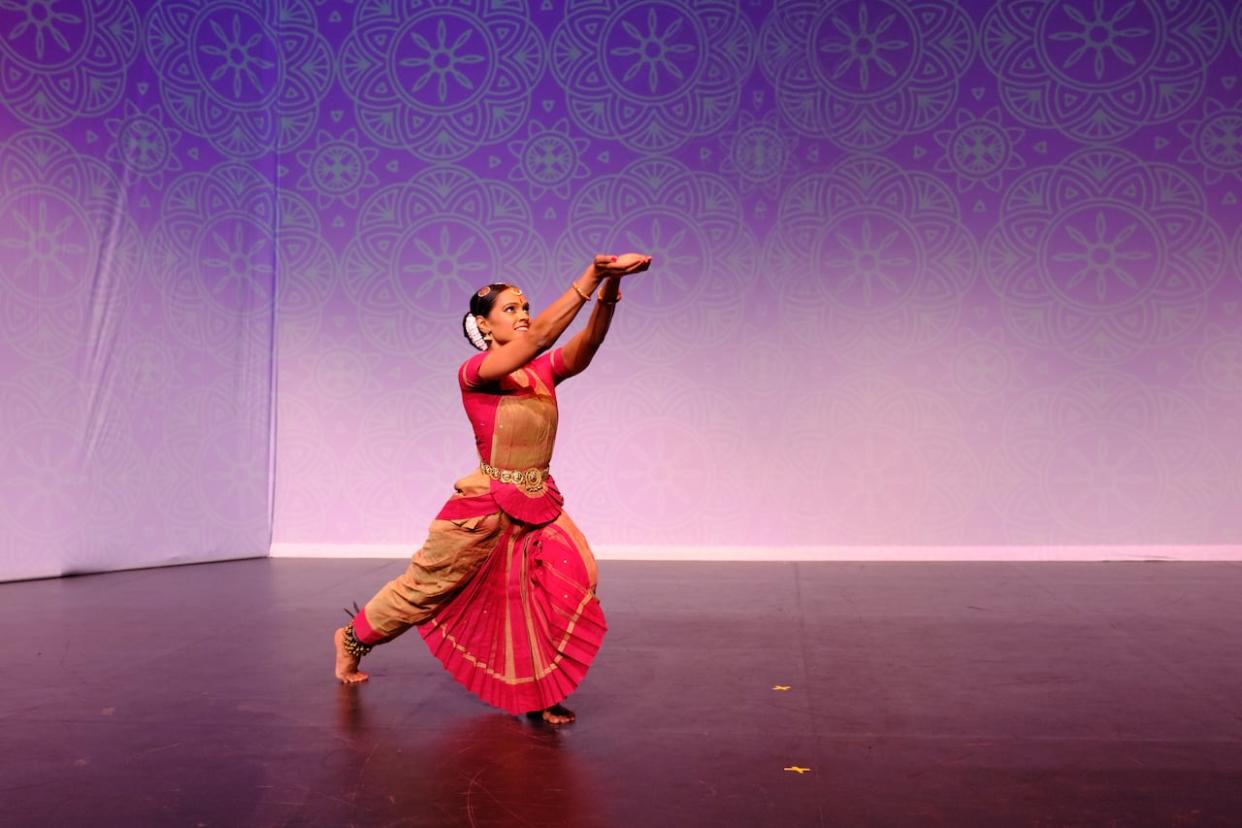Dance, drums, duty: Tamil Canadians honour heritage by teaching traditional art forms

Far from where they originated, ancient Tamil art forms are front and centre at B.C.'s Tamil Heritage Month celebrations, marking the growing Tamil community across the province and their efforts to preserve cultural traditions.
For Kiruthika Rathanaswami, 36, practising bharatanatyam, a traditional dance known for statuesque poses and intricate footwork, has helped connect with her roots.
"A lot of how I have learned about my culture is through the dance form," said Rathanaswami, who works at the University of British Columbia and dances professionally with Mandala Arts and Culture and Nova Dance.
"My dad got me into [classes] … in grade four … and I've never turned back. I've fallen in love with the dance form."
Rathanaswami and many other Tamil Canadians in B.C. are using their knowledge of various performing arts as a bridge to educate western audiences and younger generations.
While Rathanaswami says B.C.'s relatively small Tamil population has limited access to teachers, compared to Ontario's larger community, she hopes younger generations will dedicate themselves to learning the arts and fusing tradition with their Canadian identities. According to Statistics Canada, there are 9,740 Tamil speakers in B.C. and 192,890 in Ontario.
"Without dance, I don't know what kind of person I would be today … My Indian, Tamil [and] Canadian identities are merged through these activities that I'm able to participate in," she said.
"My practice has been in the Canadian context, but it's very authentic … Bringing and sharing that [knowledge] will also help cultural practices continue forward."
Tamil Heritage Month takes place in January, was recognized federally in 2016 and provincially in 2020.
WATCH | Professional bharatanatyam dancer performs in Vancouver in 2022:
For Devanesan Loganathan, president of the Thamil Cultural Society of B.C. (TCSBC), Tamil Heritage Month is not only a time to celebrate art, but a time to thank B.C. for welcoming the Tamil community since the 1950s.
While people initially came to B.C. for education, he says many Tamils also fled civil war in Sri Lanka since the late 1980s — including himself.
Friction between Sri Lanka's majority Sinhalese and minority Tamil ethnic groups escalated into civil war in 1983. Conflicts arose following the British occupation, introduction of legislation that favoured the Sinhalese, and calls for an independent Tamil homeland.
The war ended in 2009, when the Sri Lankan government announced it had killed the leader of the Liberation Tigers of Tamil Eelam, which is listed as a terrorist group in Canada.
"I never felt Sri Lanka was my home … I never had the freedom to express myself," Loganathan said.
"The first time I voted was in B.C. That is the first time I felt that I am in a safe place, a country which I can call home."
B.C. made global headlines in 2009 and 2010 after Tamil refugees arrived in Vancouver Island to escape the atrocities of the civil war in Sri Lanka.
WATCH | Ensemble of carnatic musicians play traditional song Thillana:
Sayenden Supramaniyam, 34, was two years old when he left Sri Lanka for Toronto with his family, and moved to Vancouver during his teens.
Armed with knowledge of the mridangam, a horizontal drum used in dance and musical performances, he started teaching kids in Vancouver.
"Initially I wasn't thinking about the longevity of the art … [teaching] was a good way for me to stay in touch with the music," he said.
Now juggling a job at Amazon with a few weekly students, Supramaniyam says he continues to teach to showcase the instrument to his own kids.
"[My son] has a little drum … so he'll pull it up and start playing along … We just want to make sure they can appreciate their background," he said.
"This drum has been around … for thousands of years … It would be a shame if we lose out on it now."
Loganathan hopes TCSBC can one day have a cultural centre in B.C. to preserve art forms like bharatanatyam and mridangam in the province.
"These things are [part of] our identities … They are the heart and soul of our culture," he said.
"At least future generations need to know a little bit. We don't have to be an expert, but have some knowledge."


